The United Kingdom has long served as a unique crucible for musical innovation, acting not merely as a producer of entertainment, but as a generator of spiritual and cultural shifts that ripple across the globe. From the damp basements of Liverpool to the industrial warehouses of Manchester, British music movements have historically captured the Zeitgeist—the spirit of the times—and transmuted societal pressure into art that liberates the human soul.
At Spiritual Culture, we believe that a music movement is defined not by record sales, but by its ability to alter human behavior, challenge authority, and foster connection. Whether it is the raw truth-telling of Punk or the transcendental unity of the Rave scene, these movements offer a window into the collective consciousness of their eras. They serve as historical markers of how humanity has sought joy, rebellion, and identity through sound.
As of the Current Time of Writing (November 2025), the legacy of these movements remains a vital part of global heritage. The list below prioritizes movements based on their lasting spiritual impact, their capacity to unify diverse groups, and their contribution to the emotional evolution of modern society.
Table of the Top 10 British Music Movements with the Greatest Spiritual Influence
| Rank | Movement | Key Era | Spiritual & Cultural Essence | Key Icons/Bands |
|---|---|---|---|---|
| 1 | The British Invasion | 1962–1967 | Global awakening, joy, and youth emancipation | The Beatles, The Rolling Stones, The Kinks |
| 2 | Acid House / Rave | 1988–1994 | Collective consciousness, ego dissolution, PLUR | The Prodigy, Orbital, A Guy Called Gerald |
| 3 | Punk Rock | 1976–1979 | Raw truth, purification through chaos, DIY ethic | Sex Pistols, The Clash, The Damned |
| 4 | 2-Tone / Ska Revival | 1979–1981 | Racial harmony, social solidarity, joy in struggle | The Specials, The Selecter, Madness |
| 5 | Heavy Metal | 1968–1980s | Catharsis, industrial power, tribal belonging | Black Sabbath, Iron Maiden, Judas Priest |
| 6 | Progressive Rock | 1969–1977 | Intellectual spiritualism, fantasy, transcendence | Pink Floyd, Genesis, Yes |
| 7 | Glam Rock | 1971–1975 | Fluid identity, theatricality, escapism | David Bowie, T. Rex, Roxy Music |
| 8 | Britpop | 1993–1997 | National optimism, cultural celebration, identity | Oasis, Blur, Pulp |
| 9 | Shoegaze | 1988–1993 | Introspection, sonic immersion, ethereal dreaming | My Bloody Valentine, Slowdive, Ride |
| 10 | Trip-Hop | 1991–1998 | Urban reflection, melancholic soul, post-industrial calm | Massive Attack, Portishead, Tricky |
Top 10. Trip-Hop
Emerging from the multicultural melting pot of Bristol in the early 1990s, Trip-Hop was the sound of the “after-party”—a slow, hypnotic fusion of hip-hop breakbeats, dub reggae, and ambient electronica. Unlike the aggressive energy of its contemporaries, Trip-Hop was deeply internal. It reflected the mood of a post-industrial city, blending urban grit with a cinematic, almost spiritual melancholia that allowed listeners to sit with their darker emotions rather than run from them.
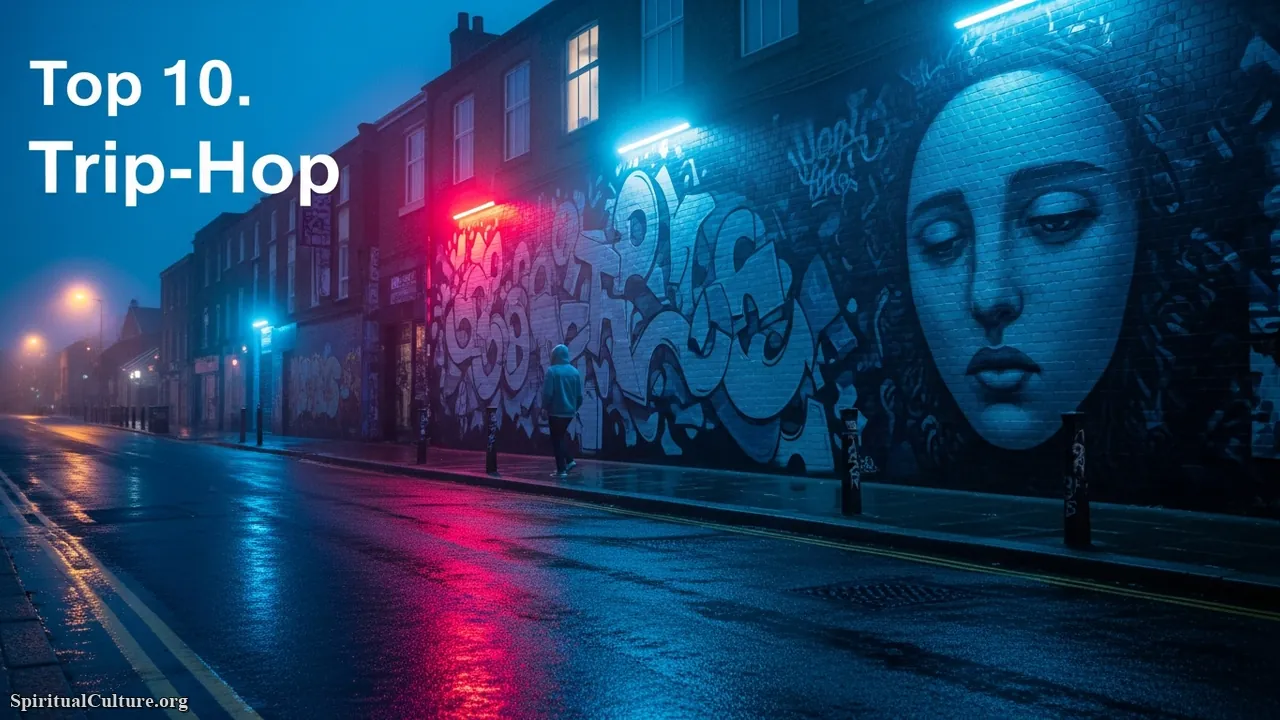
The spiritual impact of Trip-Hop lies in its capacity for shadow work. By slowing down the tempo and introducing haunting vocals, artists like Massive Attack and Portishead created a sonic space for reflection on isolation, urban decay, and longing. It was a movement that validated sadness and anxiety, turning them into high art. It taught a generation that there is profound beauty in the “down-tempo” moments of life, and that silence and space are as important as noise.
Today, Trip-Hop is revered not just as a genre, but as a mood—a heritage of “Blue” spiritualism. It reminds us that in a world of constant acceleration, there is value in slowing down and facing the complexities of the human psyche. It is the soundtrack of modern introspection.
Cultural & Spiritual Highlights:
- The Bristol Sound: A unique cultural product of Caribbean sound system culture merging with British post-punk.
- Emotional Honesty: Validated vulnerability and darkness as essential parts of the human experience.
- Cinematic Atmosphere: Used sound to create immersive mental landscapes for the listener.
Top 9. Shoegaze
Shoegaze, named for the musicians’ tendency to stare at their guitar effects pedals while performing, emerged in the late 80s as a rejection of the ego-driven rock star persona. Bands like My Bloody Valentine and Slowdive used volume not for aggression, but to create “walls of sound” that washed over the audience. It was a texture-focused movement where vocals were often buried in the mix, treating the human voice as just another instrument in a swirling, dreamlike ocean.
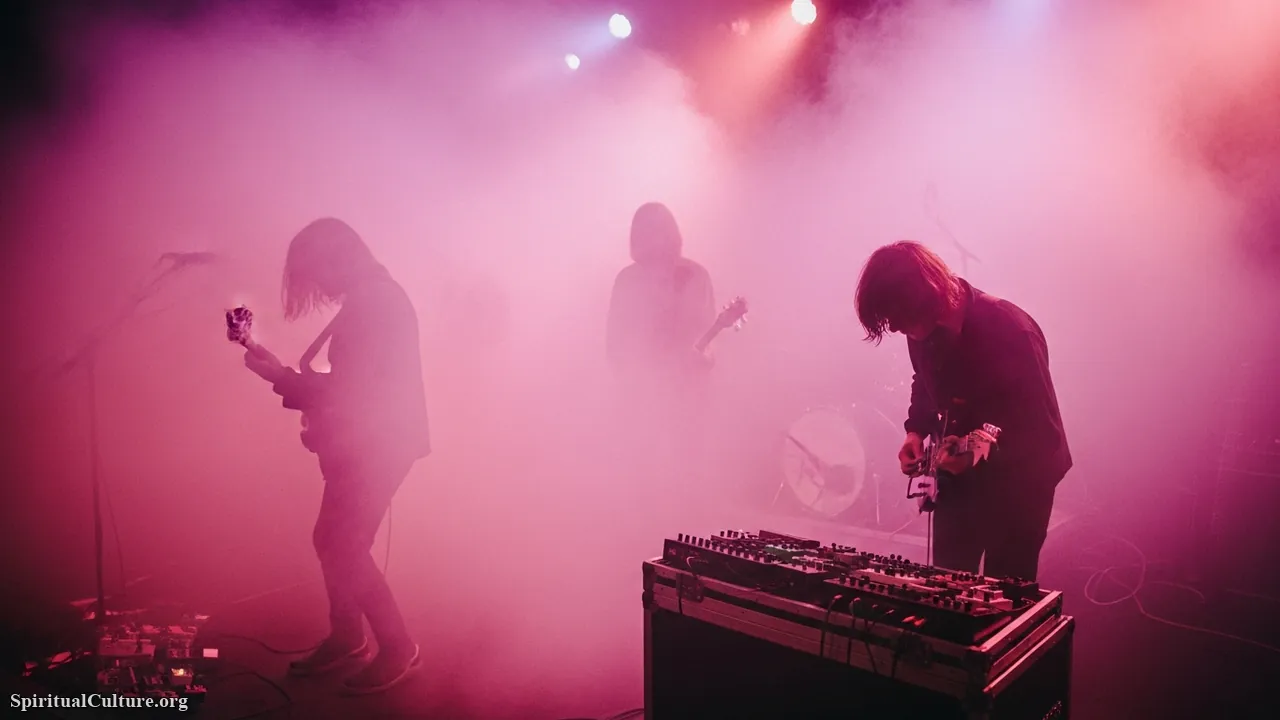
From a Spiritual Culture perspective, Shoegaze represents the desire for dissolution. The overwhelming volume and reverb served to drown out the self, allowing both the performer and the listener to get lost in a sensory experience that bordered on the oceanic feeling of meditation. It was less about the “message” of the lyrics and more about the transcendent state induced by the sound itself—a form of sonic escapism that felt like waking dreaming.
The preservation value of Shoegaze lies in its purity of artistic intent. It championed the idea that vulnerability and noise could coexist. It teaches us that sometimes, we do not need to be the center of attention; sometimes, the most profound spiritual experience is to simply dissolve into the texture of the world around us.
Cultural & Spiritual Highlights:
- Ego Death: De-emphasized the “frontman” in favor of a collective, overwhelming sound.
- Sonic Immersion: Created a meditative, trance-like state through feedback and distortion.
- Androgynous Energy: Often blurred gender lines in vocals and aesthetics, focusing on the ethereal.
Top 8. Britpop
In the mid-1990s, as a counter-reaction to the dour seriousness of American Grunge, Britain exploded with a Technicolor burst of optimism known as Britpop. Bands like Oasis, Blur, and Pulp reclaimed British cultural identity, drawing on the heritage of the Beatles and the Kinks but injecting it with a modern swagger. It was a movement characterized by anthemic choruses, Union Jack iconography, and a sense of communal celebration that swept the nation.
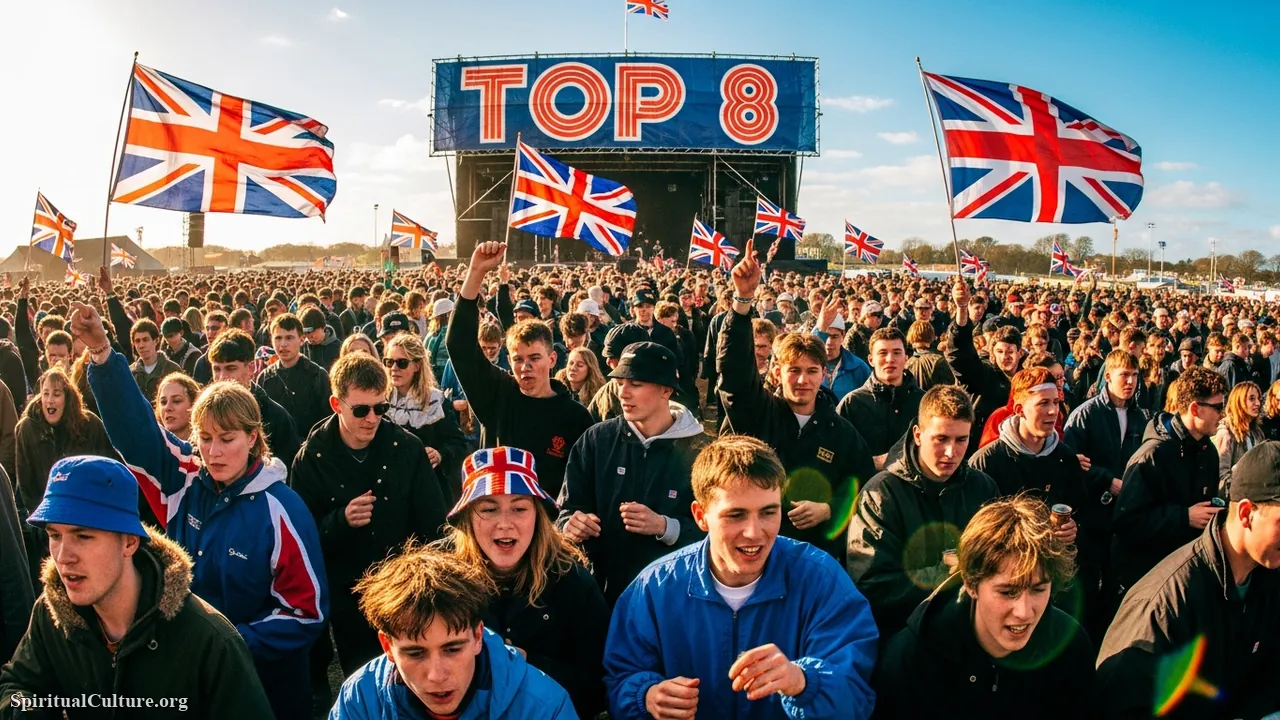
While often criticized for its commercialism, the spiritual value of Britpop was its ability to generate collective joy and a sense of belonging. In an era of political transition, it provided a unifying narrative for the youth. Songs like “Common People” or “Don’t Look Back in Anger” became secular hymns, sung by thousands in stadiums, creating a palpable energy of shared experience. It was a moment where the culture looked in the mirror and decided to celebrate itself.
The lesson of Britpop is the power of confidence and community. It reminds us that celebrating one’s roots and culture can be an empowering act of defiance. While the party eventually ended, the heritage of Britpop remains a testament to the power of music to lift the collective mood of a nation.
Cultural & Spiritual Highlights:
- Cultural Reclamation: Re-ignited pride in British art, fashion, and musical heritage.
- Secular Hymns: Created anthems that are still used today to bond crowds in moments of celebration or tragedy.
- Class Commentary: Bands like Pulp brought sharp, witty observations of social class to the mainstream.
Top 7. Glam Rock
In the grey, post-hippie hangover of the early 1970s, Glam Rock descended like a glittery spacecraft. Spearheaded by figures like David Bowie (Ziggy Stardust) and Marc Bolan, this movement was a theatrical rebellion against the mundane. It rejected the denim-clad “authenticity” of serious rock in favor of artifice, makeup, and science fiction narratives. It was visual, outrageous, and deeply liberating.

The spiritual core of Glam Rock is the fluidity of identity. It told a generation of teenagers that they were not bound by the identity they were born into; they could construct their own reality. By blurring the lines between male and female, human and alien, Glam Rock provided a sanctuary for the “outsider.” It was a spiritual practice of self-creation, suggesting that we are all actors on a stage, and we have the divine right to choose our costumes.
Glam Rock’s legacy is the bedrock of modern LGBTQ+ acceptance and self-expression in pop culture. It taught us that “fake” can be a path to a deeper truth. The moral lesson here is profound: true freedom is the ability to imagine yourself anew, regardless of societal norms.
Cultural & Spiritual Highlights:
- Identity Liberation: Pioneered the breakdown of gender norms in popular culture.
- Theatrical Spirituality: Used myth-making and alter-egos (e.g., Ziggy Stardust) to explore the human condition.
- Escapism as Medicine: Provided a colorful, joyful escape during a time of economic hardship.
Top 6. Progressive Rock
Progressive Rock, or “Prog,” emerged in the late 60s as musicians began to view rock not just as entertainment, but as high art capable of tackling the biggest questions of existence. Bands like Pink Floyd, Genesis, and Yes incorporated classical structures, complex time signatures, and lyrics drawing from philosophy, literature, and fantasy. It was music for the mind as much as the soul.
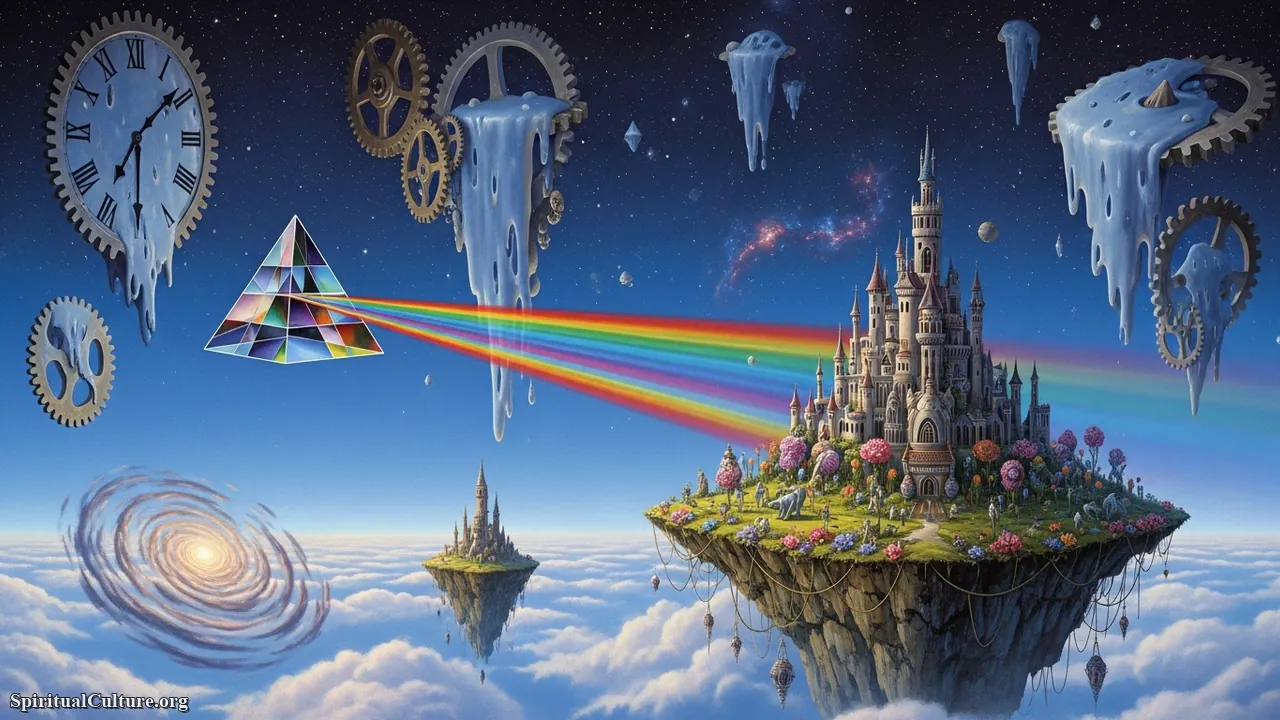
At Spiritual Culture, we view Prog as a quest for intellectual transcendence. Albums like The Dark Side of the Moon were not mere collections of songs but cohesive spiritual journeys exploring madness, time, greed, and death. This movement demanded patience and attention from its listeners, encouraging deep listening and contemplation. It bridged the gap between the visceral power of rock and the structural complexity of classical music, elevating the spiritual potential of the genre.
The heritage of Prog is the ambition to push boundaries. It serves as a reminder that popular culture need not be simple; it can be challenging, long-form, and profound. It validates the human need for complexity and the desire to build “cathedrals of sound” that reach for the sublime.
Cultural & Spiritual Highlights:
- Philosophical Themes: Directly addressed existentialism, mental health, and the human perception of time.
- Technical Mastery: elevated the standard of musicianship, treating the instrument as a tool for spiritual exploration.
- Conceptual Unity: Popularized the “Concept Album” as a singular, cohesive artistic statement.
Top 5. Heavy Metal
Forged in the industrial heartlands of the Midlands (Birmingham), Heavy Metal was the sonic manifested of the factory floor—clanging, heavy, and powerful. Bands like Black Sabbath took the blues and darkened it, creating a sound that confronted the grim realities of life, war, and the occult. It was a loud, aggressive response to the failure of the “peace and love” generation to stop the violence of the world.
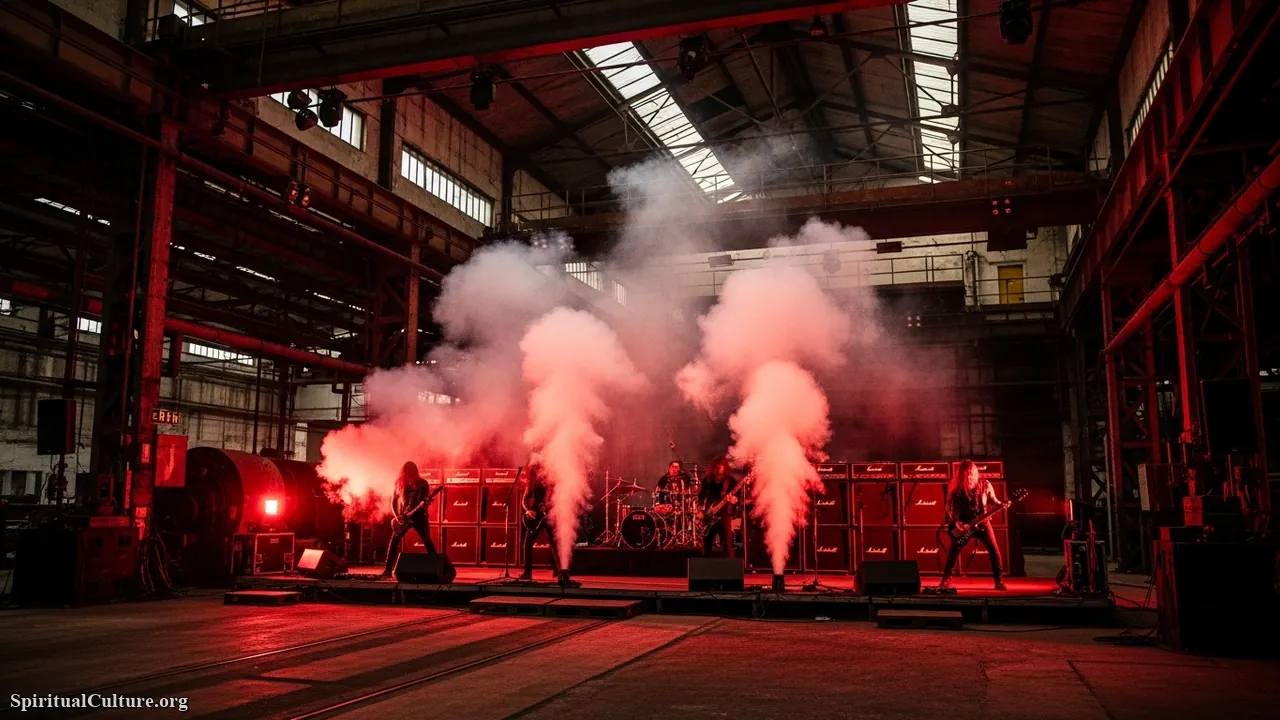
The spiritual function of Heavy Metal is catharsis. It provides a safe, ritualistic space for the release of aggression, anger, and darkness. Far from being “evil,” the metal community is often one of the most inclusive and tight-knit “tribes” in music. The music serves as a confrontation with the shadow self, allowing listeners to process negative emotions through extreme volume and power. It is a modern form of exorcism—expelling the demons of daily life through the power of the riff.
Heavy Metal remains one of the UK’s most enduring global exports. Its preservation value lies in its honesty about the darker aspects of the human experience. It teaches us that we must face the darkness to find the light, and that there is immense power in finding a community that accepts you, flaws and all.
Cultural & Spiritual Highlights:
- Industrial Roots: A direct cultural reflection of the UK’s industrial working-class heritage.
- Ritualistic Catharsis: Concerts serve as high-energy rituals for releasing pent-up societal pressure.
- The “Outsider” Tribe: Created a global, fiercely loyal community for those who felt marginalized by mainstream culture.
Top 4. 2-Tone / Ska Revival
In the late 1970s, as the UK was fractured by racial tension and the rise of far-right nationalism, a movement emerged from Coventry that preached unity through dance. 2-Tone fused the walking basslines of Jamaican Ska with the energy of British Punk. Bands like The Specials and The Selecter featured multi-racial lineups and created a distinct aesthetic: the black and white checkerboard, symbolizing the coexistence of races.
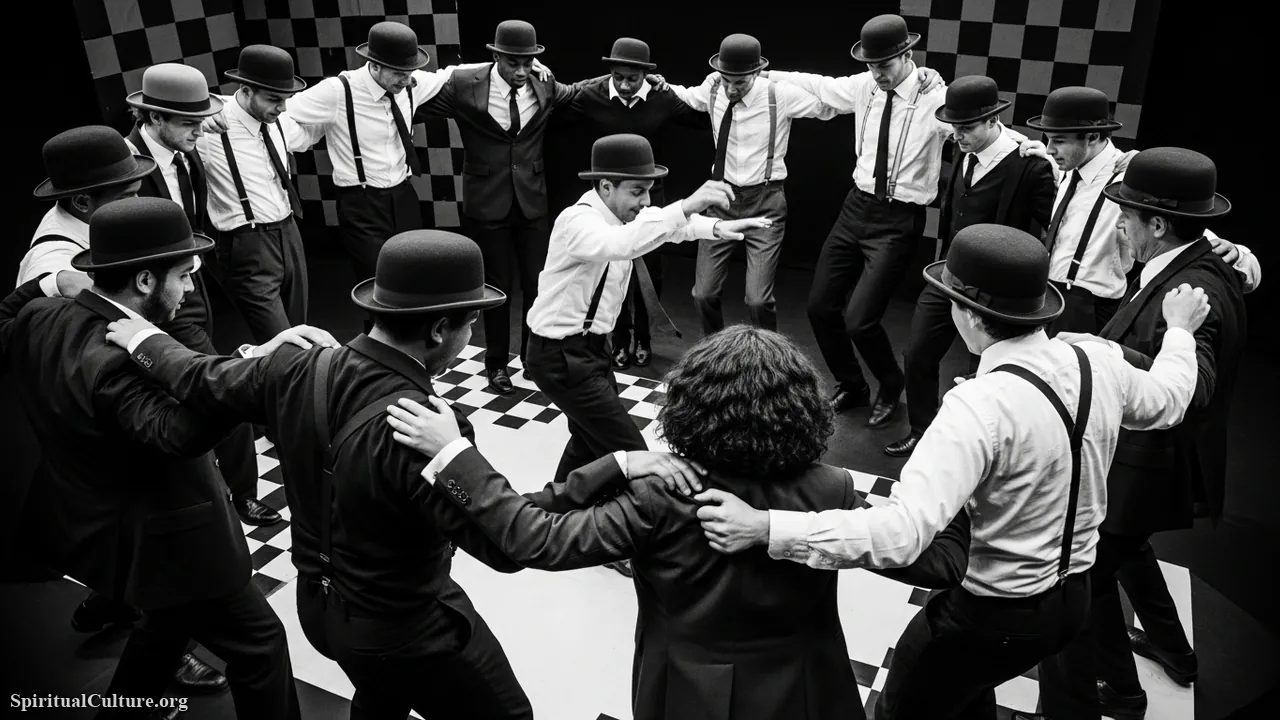
This is perhaps the most morally courageous movement on our list. 2-Tone did not just sing about unity; they embodied it on stage. In a time of riots and racism, they made music that forced people to dance together. The spiritual impact was immediate and tangible: it broke down barriers in youth clubs and dance halls across the country. The lyrics often contained sharp social commentary, yet the music was undeniably joyful, proving that protest can be celebratory.
The legacy of 2-Tone is a beacon of multiculturalism. It stands as a historical testament to the fact that culture can heal societal wounds. The checkerboard remains a sacred symbol of British musical heritage, reminding us that we are stronger when we mix, blend, and dance as one.
Cultural & Spiritual Highlights:
- Visual Unity: The black-and-white checkerboard aesthetic became a universal symbol for anti-racism.
- Joyous Protest: Combined politically charged lyrics with danceable, uplifting rhythms.
- Integration: Actively integrated audiences in a segregated time, creating a physical space for harmony.
Top 3. Punk Rock
By 1976, Britain was suffering from economic stagnation, and rock music had become bloated and distant. Punk Rock exploded as a necessary corrective—a “Year Zero” meant to destroy the old order. With three chords and the truth, bands like the Sex Pistols and The Clash screamed against the monarchy, the establishment, and boredom itself. It was ugly, confrontational, and utterly vital.

The spiritual essence of Punk is purification through truth. It stripped away the virtuosity and polish of music to reveal the raw human spirit underneath. The “DIY” (Do It Yourself) ethic was a profound spiritual empowerment, teaching the youth that they didn’t need permission to create, to speak, or to be. Punk demanded that you question everything—authority, society, and even yourself. It was an anarchic form of Zen: destroying the illusions of society to see the reality.
Punk’s influence is woven into the DNA of every counter-culture that followed. It teaches the eternal moral lesson that when systems become corrupt or stagnant, it is the duty of the youth to disrupt them. It is the spirit of raw, unadulterated agency.
Cultural & Spiritual Highlights:
- The DIY Ethic: Demolished the barrier between “artist” and “audience,” empowering everyone to create.
- Truth to Power: Functioned as a direct challenge to the social hierarchies and economic despair of the 1970s.
- Creative Destruction: Proved that destruction of the old is often necessary for the birth of the new.
Top 2. Acid House / Rave
In the late 80s, a new electronic sound arrived from the US and mutated in the UK into a cultural tsunami known as Acid House. Fuelled by the Roland TB-303 synthesizer and the empathetic effects of Ecstasy, the “Second Summer of Love” in 1988 saw thousands of youths gathering in fields and warehouses to dance until dawn. This was not a concert; it was a congregation.

At Spiritual Culture, we rank Rave this high because it was arguably the largest collective spiritual experience of modern British history. The ethos of PLUR (Peace, Love, Unity, Respect) was not just a slogan; it was a lived reality on the dancefloor. In these spaces, class structures, football rivalries, and race dissolved. The “ego” of the individual was replaced by the “we” of the crowd. It was a technotranscendental movement that reintroduced the ancient tribal practice of ecstatic dance to the modern West.
The Rave movement changed the emotional landscape of Britain, making the culture more open, affectionate, and communal. Its legacy protects the idea of the “Safe Space”—a temporary autonomous zone where humanity can unite in rhythm. It reminds us that at our core, we yearn for connection without judgment.
Cultural & Spiritual Highlights:
- PLUR Ethos: Institutionalized Peace, Love, Unity, and Respect as the governing laws of the subculture.
- Dissolution of Class: The darkness of the warehouse leveled the playing field; everyone was equal under the strobe light.
- Modern Shamanism: The DJ acted as a shaman, guiding the crowd through an emotional journey of tension and release.
Top 1. The British Invasion
In the early 1960s, led by The Beatles, British music didn’t just cross the Atlantic; it conquered the world. But to view the British Invasion merely as a commercial success is to miss its profound spiritual magnitude. This movement marked the Great Awakening of global youth culture. It was the moment when the post-war generation threw off the grey austerity of their parents and embraced color, joy, and possibility.
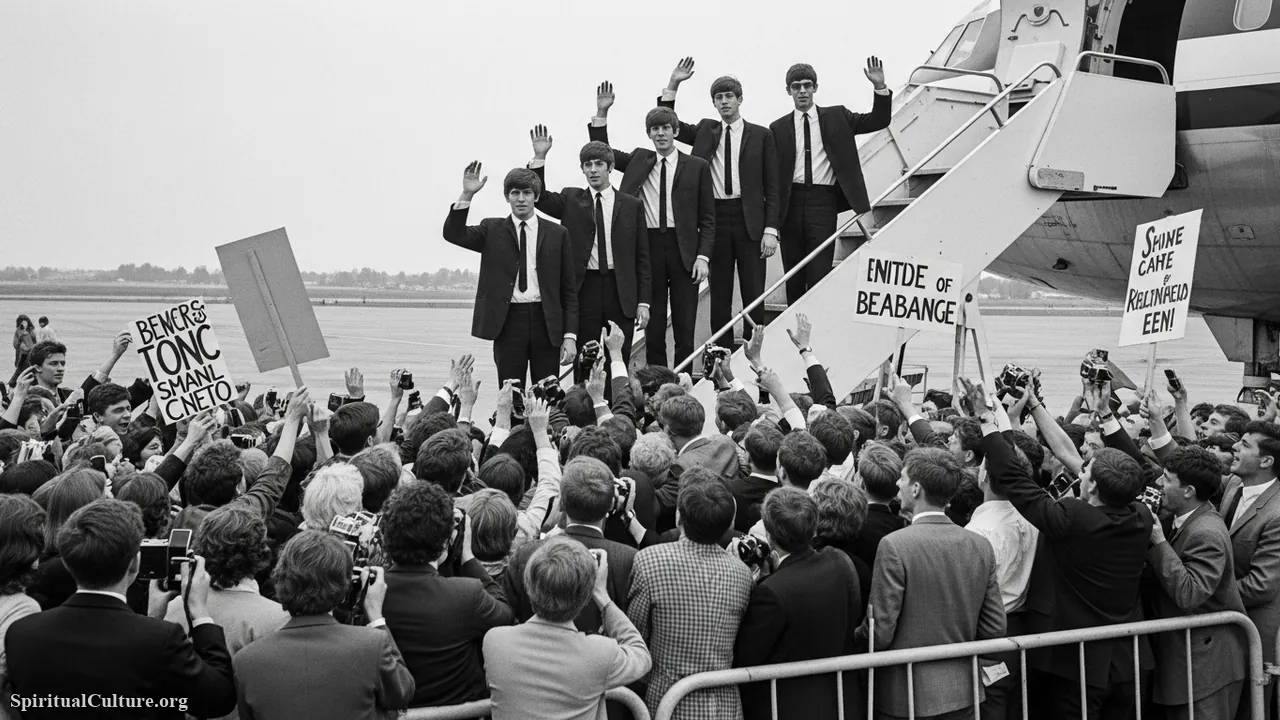
The Beatles and their contemporaries acted as global avatars for love and expansion. From the simple joy of “She Loves You” to the spiritual philosophizing of “Tomorrow Never Knows,” this movement expanded the consciousness of the human race. It introduced Eastern spirituality to the West, championed the concept of “All You Need Is Love,” and validated the idea that youth culture could be a force for peace and revolution.
We rank this #1 because it created the template for everything that followed. It was the “Big Bang” of modern spiritual culture. The British Invasion taught the world that music is not just a diversion—it is a vehicle for changing the world. Its legacy is the very concept of the “Global Village,” connected by song.
Cultural & Spiritual Highlights:
- Global Connection: The first time a music movement simultaneously synchronized the emotions of the entire Western world.
- Eastern Synthesis: The Beatles played a pivotal role in introducing meditation and Indian spirituality to mainstream Western culture.
- The archetype of Joy: Replaced the post-war trauma with an explosion of optimism and creative freedom.
Conclusion
The history of British music is a history of the human spirit seeking freedom. From the grimy industrial catharsis of Heavy Metal to the open-armed love of the Acid House movement, these top 10 movements demonstrate that culture is never static. It is a living, breathing entity that evolves to meet the spiritual needs of the time.
At Spiritual Culture, we celebrate these movements not just for the songs they left behind, but for the communities they built and the barriers they broke. They remind us that whether we are staring at our shoes in introspection or screaming the truth into a microphone, we are all participating in the great, shared ritual of being human. Music, in its highest form, is the sound of our collective soul breaking free.





